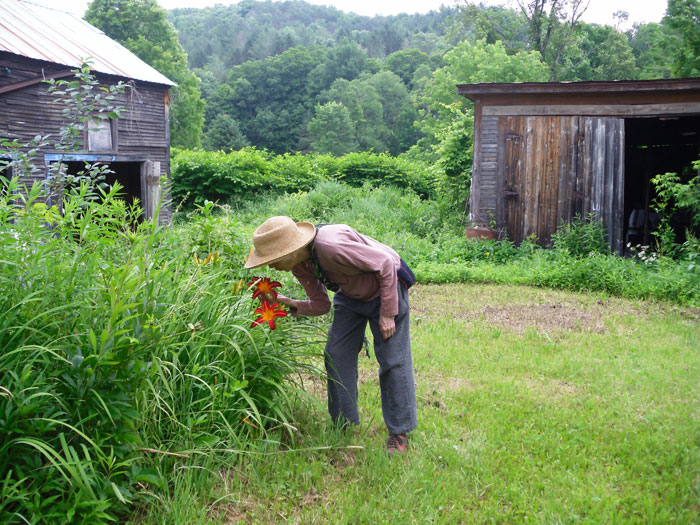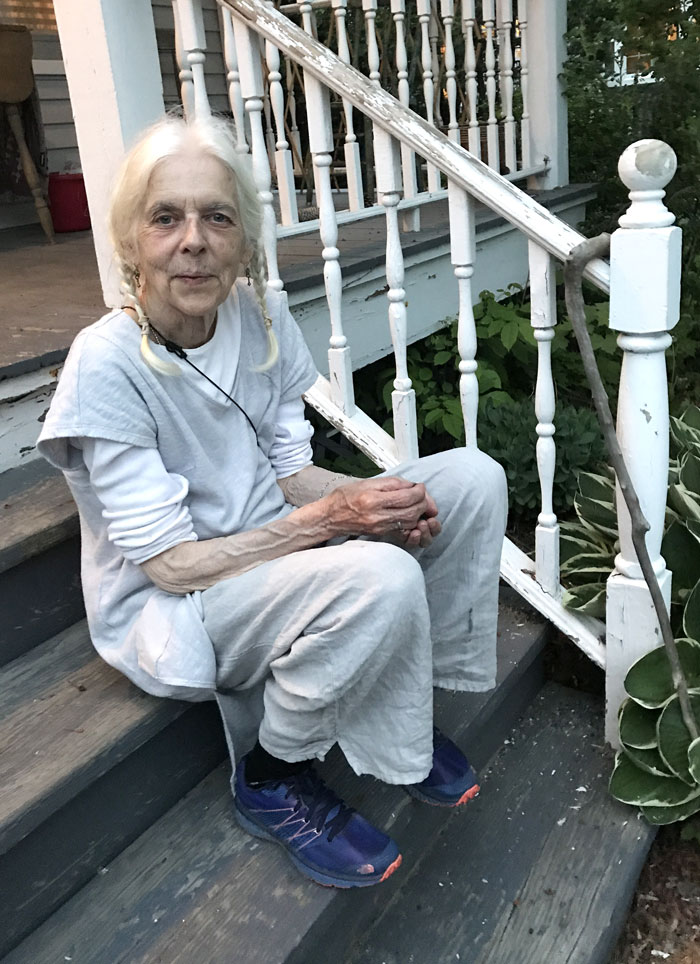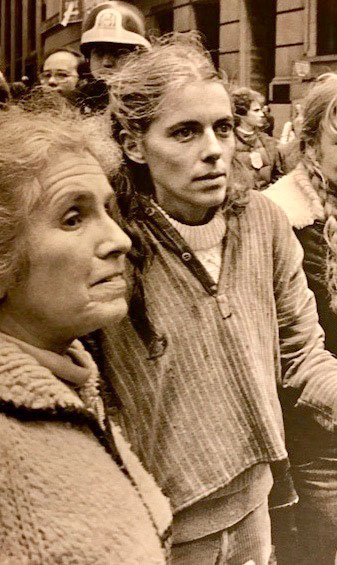| A Tribute to Cora Vail Brooks, 1941–2018 | |||||||||||||||||
Photo: Karen Gerdel |
|||||||||||||||||
Cora Brooks, poet, painter, playwright, and longtime peace activist, died peacefully on October 16, 2018, at McClure Miller Respite House in Colchester, Vermont. She was born in New York City, on April 9, 1941, and grew up in Hastings-on-Hudson, New York. She received her BA from Sarah Lawrence College, and after graduation became a research assistant at the Harvard Epworth Cooperative Nursery School. Through the years, she taught writing at several colleges, including Wheaton College, Goddard College, and Lesley University. In the 1980s she helped found Chelsea Help for Battered Women. Cora was an ardent activist, attending numerous protests against the Vietnam War in the 1960s and against nuclear power in the 1970s, getting herself arrested on six occasions. Cora published, through Acorn Press (Chelsea, Vermont), several chapbooks of her poetry, including Heather in a Jar, Ransom for the Moon, and Rinds, Roots and Stars, and a book of writing exercises, The Sky Blew Blue (New Victoria Publishers, Norwich). She wrote several plays, one of which was produced Off Broadway at the Houseman Theater in New York City. Her diaries, poems, essays, book reviews, and letters are in the archives of the Schlesinger Library on the History of Women at the Radcliffe Institute for Advanced Study, Harvard University. Cora lived a thoughtful, intentional life, and she died a thoughtful, intentional death. In April, she announced to friends and family that she was going to cease eating and drinking on September 24, near the equinox. She held true to her word, eating only one basil leaf, one lemon drop, and one lime popsicle after her self-appointed date. She leaves behind her sister, Toni Brooks-Floyd, and brother, Josh Brooks; her children, Oona and Luke Metz; her grandchildren, Lucia, Olivia, Lily, and A.J.—and many, many friends. In memory of Cora, Vermont Woman asked five women friends, who knew her in different ways and at different points in her life, to write about her.
We were family. Cora’s grandmother’s sister was my grandfather’s first wife giving Cora and me that close and binding familial relationship of step second cousins. Not only was Cora family, she was insightful, grounding, and generous. In her generosity she helped me connect to my best self. In my first memory of Cora, I am 3 years old. It is summer. She breezed into our home, hair long and flowing, face smiling. I don’t think I understood what cool was. And that wasn’t really what she was. Really, this first image of her that I hold on to is all about life. She felt like life to me.
My family had dinner parties, semiformal events. My mother made them into seemingly effortless festivities filled with courses and candles and place cards. Once she made a centerpiece of curved blackberry branches, loaded with berries, and the guests picked the ripe fruit during dessert. These were special and frequent events where everything sparkled. In the late afternoon of one of those parties, when I knew Cora was coming and after my mother had set everything perfectly, I quietly went into the dining room and circled the table. I moved the names around so I would be next to Cora. I know Cora thought I was being subversive. I know I just needed to be close to her. I drove up to Colchester to say good-bye to Cora. I arrived early in the morning. It was still dark. She was sleeping. I had brought skeins of yarn to wind into balls. And so I began winding. Round and round and round. It started to get light. I kept winding. Cora opened her eyes and her focus settled on me. “Have you been here all night?” she asked. No, I said, I came up early this morning to help send you off. A glimpse of a smile held her face. Her hand, that thin boney beautiful hand, picked itself up and waved good-bye.
Cora Brooks embodied imagination for me. Last week, I was alone in her house, boxing up her books, and every object seemed metaphor: the 19 pair of eyeglasses on the kitchen table, the handsome old cast iron she cooked in, the objects like talismans on top of the window sashes, her paintings along all the walls—all glimpses of a mind never at rest but always resting on something. Everything seemed to contain a message, or marching orders.
Cora was all light—dressing in white the night she knew she was having one of her strokes. She said she knew she was dressing for the afterlife. Thereafter, every delight led her to exclaim she was living the best afterlife. Time slowed in her company, and I often had no idea where it went. We ate at a small table in her aquamarine house by the river. We ate with silver forks and spoons and made tea in a broken teapot. She set the table with a collection of loved objects, and she spoke like no one I have ever known. Every time I visited with her, I would sit outside her house in my car afterward, afraid to forget anything she had said. She spoke as if in the lyric moment, translating life into poetry while eating fishcakes, just talking. I loved entering that space with her. The way she blurred the line between life and art—the way she lingered in the moment and in its language—remains for me the single biggest gift she gave me as a poet. The life is the poem, and the poem is life. I spent this morning washing a few of her things, some bowls and a teacup of hers, and put them to use in my house as if I were bringing her home to me, as I would a grandmother’s things. Cora told me she wanted to have written six poems that are as useful as spoons. I made an egg in her frying pan and drank coffee from one of her china cups painted with columbine. I put her wooden bowl on my dining room table, empty, and her tiny tea set on the window sill above my writing desk. And I read her poem “Keeping” again and again, for its usefulness.
I met Cora Brooks 40 years ago, soon after my move to Chelsea, Vermont. I was mother to first one son and then soon another. My husband and I had been pleased to move into the country from Boston to secure a life of nature for our two children, an original life. Cora was someone who intrigued me from our first meeting: she also had two children, 10 years older than mine, and spoke such supportive comforting stories to a new young mother. Our visits gave me courage. When I saw her standing in protest at the local post office in 1981, I questioned her reasons and met with a strong determination for justice that I had not before encountered. The next month as she stood in the post office to make others aware that registration for the draft was taking place at our post office and also that four Maryknoll nuns had been killed in South America, I stood with her in resistance. The third month we were joined by four others in our stand of awareness. When the local sheriff came to move us along and then to arrest us, an older woman, said, “I am with them” and was arrested too. Known as the Chelsea Seven, supported by the ACLU, we defended ourselves in court and were set free. Being arrested with a friend secures the bond: Cora and I began other activities, including rescuing women from domestic violence. Meanwhile, I had escaped my home in the country and my husband, and with the death of my father, I was able to buy a large home on Main Street, Chelsea, which also housed a weaving cooperative, Upper Floor Looms. Cora lived across the street from me, and we watched out for each other—shared many meals, read and wrote poetry, and even had a joint birthday party.
I worshipped her. I was 18 and Cora was 28 when I met her: a beautiful, slender poet; the chiseled features of a pioneer woman; long black hair with two wide silver stripes on either side of the part. The level gaze of her large blue eyes. Yes, black hair and blue eyes! A winter goddess. Surely one who would have no interest in me. But what an interest she had, as it turned out, as she had in all young struggling writers. Cora gave me my first typewriter. Years later in Chelsea, Vermont, where we had both moved to, she passed on to me her hooded woolen coat that I had secretly admired. I wore it like a magic cloak, a writing talisman. She would read my fiction and give helpful critiques. Most of all, she gave us what young writers need most while we read our work aloud around her kitchen table: encouragement. The writing workshops in the old Federal colonial the color of thorn, with its wild meadow of a lawn, were the most important in my life. I’m published now because of her. Because of her generosity. Because of her insights, her wit, her sharp intelligence. The courage she gave me.
Her nerve! One year her quirky old house was assessed at a high tax rate. She went to the tax assessor’s office and told him that if her house hadn’t been lined with books, but with old carburetors, he knew damned well the tax assessment would be lower. He acquiesced. She would not be intimidated; she would fight for herself— and for the rights of all women. You died on your own terms, Cora, as you had lived. You’re in “the land of the pink skies,” as you called your destination not long before dying.
I am a musician-healer who has sat at the deathbeds of hundreds of people, guiding and supporting them through the end stage of the dying process. When I offered this help to Cora during her fast, she immediately accepted. When I arrived on the last morning of her life, she was already experiencing rapid, shallow breathing. She was in coma, but I knew that she could still hear me. So we got right to work. It often takes a person many hours or even days to move through the physical changes that ultimately lead to death, so I thought she might still have another day of work ahead of her. My hope was to simply walk her forward in the process, in a more relaxed way.
Her breathing remained rapid during this first 15-minute cycle. After a short break, I returned to her bedside and echoed her breathing pattern again. With toning, deeply soothing recorded music in the background and simple verbal suggestions like “relax,” “easy,” “freedom,” Cora’s rhythm slowed down and signs of relaxation became evident. I knew then that she was committed, so responsive was she to my guidance. The third round included my gentle singing of her favorite songs interspersed with breathing and verbal guidance. My final instruction, given all on an outbreath, was: “You will know … when it’s time … to let go”—repeated, like a poem. Her breathing became more relaxed, with longer periods of apnea (suspended breathing) in between inhalations. She was getting herself ready to finally let go. The final round was brief, dramatic and wondrous. When I sat down to breathe with her again, music playing to support both of us, her pattern changed abruptly. Little sips of breath were followed by longer pauses. I noticed splashes of oval lights dancing on the wall above her head. I gazed at them for a few moments, then looked into the room to see where the light was being reflected. But the light seemed to be coming directly out of her body, following a long line from her body to the lights on the wall. This all happened quickly, but most definitely. Then the lights vanished. Her daughter, Oona, and I became perfectly still, transfixed on Cora’s last three sips of air. And then her body died. Astonishment, and deep silence. I tell this story because I believe Cora would want it known. She was as fearless and determined in her dying as she was in life. She knew that she would find her freedom at last, and she did, when her lights jumped out of her body to bid us farewell. Her spirit knew to vacate even before her body died. And she did all this in just over an hour’s time. What a remarkable woman, and teacher, she was. Many thanks, dear friend.
|
|||||||||||||||||
Cora and Grace Paley in New York City, October, 1979, at an antiwar/antinuclear action. Photo courtesy of Nora Paley. |


